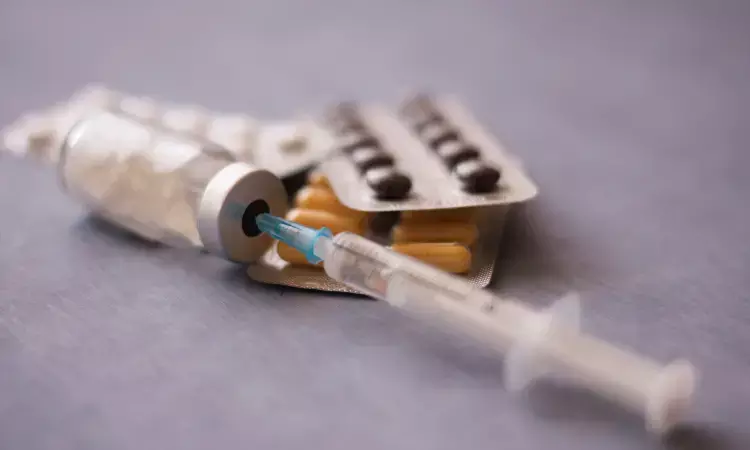- Home
- Medical news & Guidelines
- Anesthesiology
- Cardiology and CTVS
- Critical Care
- Dentistry
- Dermatology
- Diabetes and Endocrinology
- ENT
- Gastroenterology
- Medicine
- Nephrology
- Neurology
- Obstretics-Gynaecology
- Oncology
- Ophthalmology
- Orthopaedics
- Pediatrics-Neonatology
- Psychiatry
- Pulmonology
- Radiology
- Surgery
- Urology
- Laboratory Medicine
- Diet
- Nursing
- Paramedical
- Physiotherapy
- Health news
- Fact Check
- Bone Health Fact Check
- Brain Health Fact Check
- Cancer Related Fact Check
- Child Care Fact Check
- Dental and oral health fact check
- Diabetes and metabolic health fact check
- Diet and Nutrition Fact Check
- Eye and ENT Care Fact Check
- Fitness fact check
- Gut health fact check
- Heart health fact check
- Kidney health fact check
- Medical education fact check
- Men's health fact check
- Respiratory fact check
- Skin and hair care fact check
- Vaccine and Immunization fact check
- Women's health fact check
- AYUSH
- State News
- Andaman and Nicobar Islands
- Andhra Pradesh
- Arunachal Pradesh
- Assam
- Bihar
- Chandigarh
- Chattisgarh
- Dadra and Nagar Haveli
- Daman and Diu
- Delhi
- Goa
- Gujarat
- Haryana
- Himachal Pradesh
- Jammu & Kashmir
- Jharkhand
- Karnataka
- Kerala
- Ladakh
- Lakshadweep
- Madhya Pradesh
- Maharashtra
- Manipur
- Meghalaya
- Mizoram
- Nagaland
- Odisha
- Puducherry
- Punjab
- Rajasthan
- Sikkim
- Tamil Nadu
- Telangana
- Tripura
- Uttar Pradesh
- Uttrakhand
- West Bengal
- Medical Education
- Industry
Fourth dose of Pfizer vaccine may provide additional protection to elderly against severe disease: NEJM

Israel: A new study conducted by Yinon M. Bar-On and the team found that after the fourth dose of BNT162b2 vaccination, rates of confirmed SARS-CoV-2 infection and severe Covid-19 infection were lower than after only three doses. The findings of this study were published in The New England Journal of Medicine.
Israel, on January 2, 2022, began delivering a fourth dosage of the BNT162b2 vaccination to those aged 60 and over. Data on the effect of the fourth dosage on rates of confirmed SARS-CoV-2 infection and severe coronavirus illness are required in 2019. (Covid-19). In this study, researchers analyzed data from the Israeli Ministry of Health national database to examine the relative efficiency of the fourth dosage vs merely three treatments against confirmed infection and severe sickness in the Israeli population of elderly people.
Researchers gathered information on 1,252,331 people who were 60 or older and qualified for the fourth treatment during a time when the B.1.1.529 (omicron) variety of SARS-CoV-2 was prevalent (January 10 through March 2, 2022). We calculated the rate of confirmed infection and severe Covid-19 as a function of time beginning 8 days after receiving a fourth dosage (four-dose groups) and comparing it to those who had only received three doses (three-dose group) and those who had received a fourth dose 3 to 7 days earlier (internal control group). For rate estimate, quasi-Poisson regression with adjustments for age, demographic group, gender, and calendar day was utilized.
The results of this study stated as follow:
1. The aggregated four-dose groups had 1.5 cases of severe Covid-19 per 100,000 person-days (unadjusted rate), 4.2 in the internal control group and 3.9 in the three-dose group.
2. In the quasi-Poisson analysis, the adjusted rate of severe Covid-19 in the fourth week after receiving the fourth dosage was 3.5 times lower than in the three-dose group and 2.3 times lower than in the internal control group.
3. During the six weeks following the fourth dose, there was no deterioration in protection against severe sickness.
4. The aggregated four-dose groups had 177 instances of proven infection per 100,000 person-days, 361 in the three-dose group, and 388 in the internal control group.
5. The adjusted rate of confirmed infection in the quasi-Poisson analysis of the fourth week after receiving the fourth dosage was lower by a factor of 2.0 than in the three-dose group and by a factor of 1.8 than in the internal control group.
6. This protection, however, began to decrease in the following weeks.
In conclusion, these results demonstrated the efficacy of a fourth vaccination dosage against severe disease caused by the omicron variant, when compared to a third dose delivered more than 4 months earlier. A fourth dosage found to give only short-term protection and a minor absolute advantage in cases of confirmed infection.
Reference:
Bar-On, Y. M., Goldberg, Y., Mandel, M., Bodenheimer, O., Amir, O., Freedman, L., Alroy-Preis, S., Ash, N., Huppert, A., & Milo, R. (2022). Protection by a Fourth Dose of BNT162b2 against Omicron in Israel. In New England Journal of Medicine. Massachusetts Medical Society. https://doi.org/10.1056/nejmoa2201570
Medical Dialogues consists of a team of passionate medical/scientific writers, led by doctors and healthcare researchers. Our team efforts to bring you updated and timely news about the important happenings of the medical and healthcare sector. Our editorial team can be reached at editorial@medicaldialogues.in.
Dr Kamal Kant Kohli-MBBS, DTCD- a chest specialist with more than 30 years of practice and a flair for writing clinical articles, Dr Kamal Kant Kohli joined Medical Dialogues as a Chief Editor of Medical News. Besides writing articles, as an editor, he proofreads and verifies all the medical content published on Medical Dialogues including those coming from journals, studies,medical conferences,guidelines etc. Email: drkohli@medicaldialogues.in. Contact no. 011-43720751


